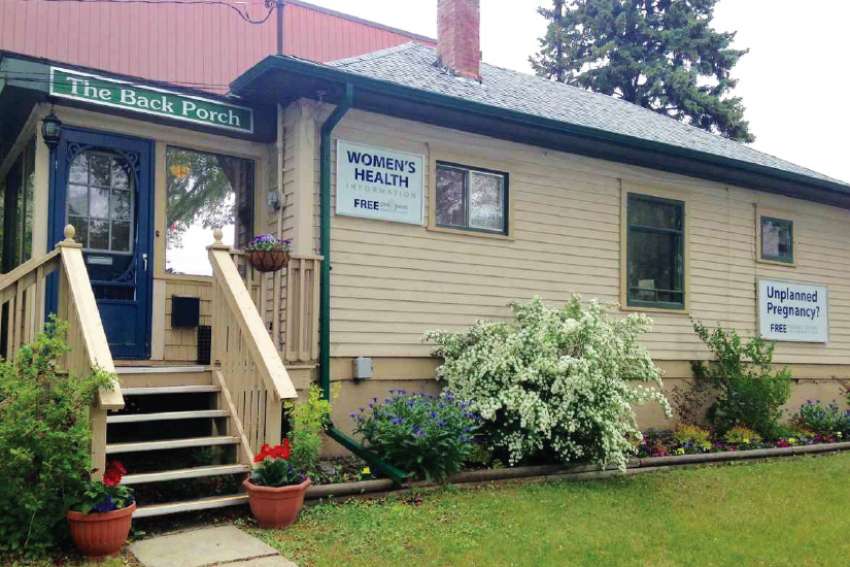The Back Porch offers pro-life ministry across abortion clinic
By Agnieszka Krawczynski, Canadian Catholic News
There is one abortion clinic in Edmonton: a squat, grey building with a single sign saying “Women’s Health Options” in small letters near a nondescript front door.
It’s not surprising many women looking for it accidentally check in at the brightly painted home across the street, with its blue door and large signs: “Women’s health information” and “Unplanned Pregnancy?” In fact, Samantha Williams is hoping for it.
“We call ourselves an 11th-hour ministry,” said the director of The Back Porch, a pro-life initiative based out of a heritage home.
“Their GPS brings them to the street and they will notice our signs before the clinic signs.”
For Williams, that moment when a woman tries to check in for an appointment and realizes she’s in the wrong place is a window of opportunity. “We try to engage with them. ‘Have you had a chance to speak with someone about all of your options?’ A lot of times they leave very quickly, but sometimes they stay to listen.”
In a month, between 40 and 80 women will step into The Back Porch. Even if they don’t stay to talk to staff or to peruse the racks of brochures about fetal development and adoption, Williams makes sure to offer each one a “gift”: a small bag with a business card, toiletries and contact details for an abortion recovery centre 10 minutes’ drive away.
“It’s an opportunity to reach people at a really vulnerable time,” said Williams, who shares the office with the only other staffer, human rights activist Mikaela Metcalfe.
The Back Porch, which opened in 2006, is the main project of ALIES, a local pro-life organization. Williams said 275 members and supporters have signed up to receive prayer intentions at a moment’s notice via text message. Others donate funds, items or help trim the lawn and care for the old home.
“We rely so much on the entire pro-life community,” said Williams.
When a woman stays to talk, Williams finds the best thing to do is listen. “She hasn’t had anyone else listen to her. Everyone has been telling her what she has to do.”
She remembers watching a 19-year-old woman who had just been to the grey clinic across the street walk up the steps to The Back Porch just to ask if she could wait inside. The temperatures on that day had dipped to freezing.
Williams invited her in and they started a conversation. She found out the girl was unmarried, pregnant and threatened to be kicked out of her family home if she did not have an abortion. The girl had gone to the clinic for an ultrasound and, in a rare move, asked to see the image of the child growing inside of her.
She then told clinic staff she wouldn’t go through with the abortion that day, but rescheduled for the following week and left.
“It turned into two hours of us sitting and talking,” said Williams, who realized the girl wanted to keep her child, but was facing immense pressure to abort.
“This young woman was so strong-willed and courageous. She knew what she wanted to do, but she needed someone else to say: ‘You can do this! It will be hard, but we will help you.’ ”
Williams referred her to some pregnancy and birth supports. When she reconnected in a week, she learned the girl had cancelled her abortion appointment, was kicked out of her home and was in a precarious living arrangement. When Williams told Back Porch supporters, a family offered the girl a space in their own home until she could get back on her feet. Her daughter is now nearly two years old.
“To see the huge transformation in this woman — she can’t imagine her life without this baby. It’s so amazing to see how proud of herself she is. She did something so hard, but she could do it, and it was so worth it.”
Those stories, however, are not the norm. Most women hardly stay long enough to take a “gift” on the way out, and the mere sight of the grey building across the street and the knowledge of what it represents can take a toll on Back Porch staff.
“Children are being killed across the street every day,” said Williams. “We try to stay level and we know that this is God’s work and this is a ministry. We try not to let the highs be too high and the lows be too low. We just stay focused.”
Metcalfe agrees. She turns to prayer when she has a hard time coping.
“It is difficult to be here and know what’s happening across the street,” she said. “It’s really great, after an interaction, to be able to pray, to give that person to God and trust that he is taking care of her.”
She also asks for “the strength to continue to do this job and talk with people even though the majority don’t stay and talk.”
Please support The Catholic Register
Unlike many media companies, The Catholic Register has never charged readers for access to the news and information on our website. We want to keep our award-winning journalism as widely available as possible. But we need your help.
For more than 125 years, The Register has been a trusted source of faith-based journalism. By making even a small donation you help ensure our future as an important voice in the Catholic Church. If you support the mission of Catholic journalism, please donate today. Thank you.
DONATE

